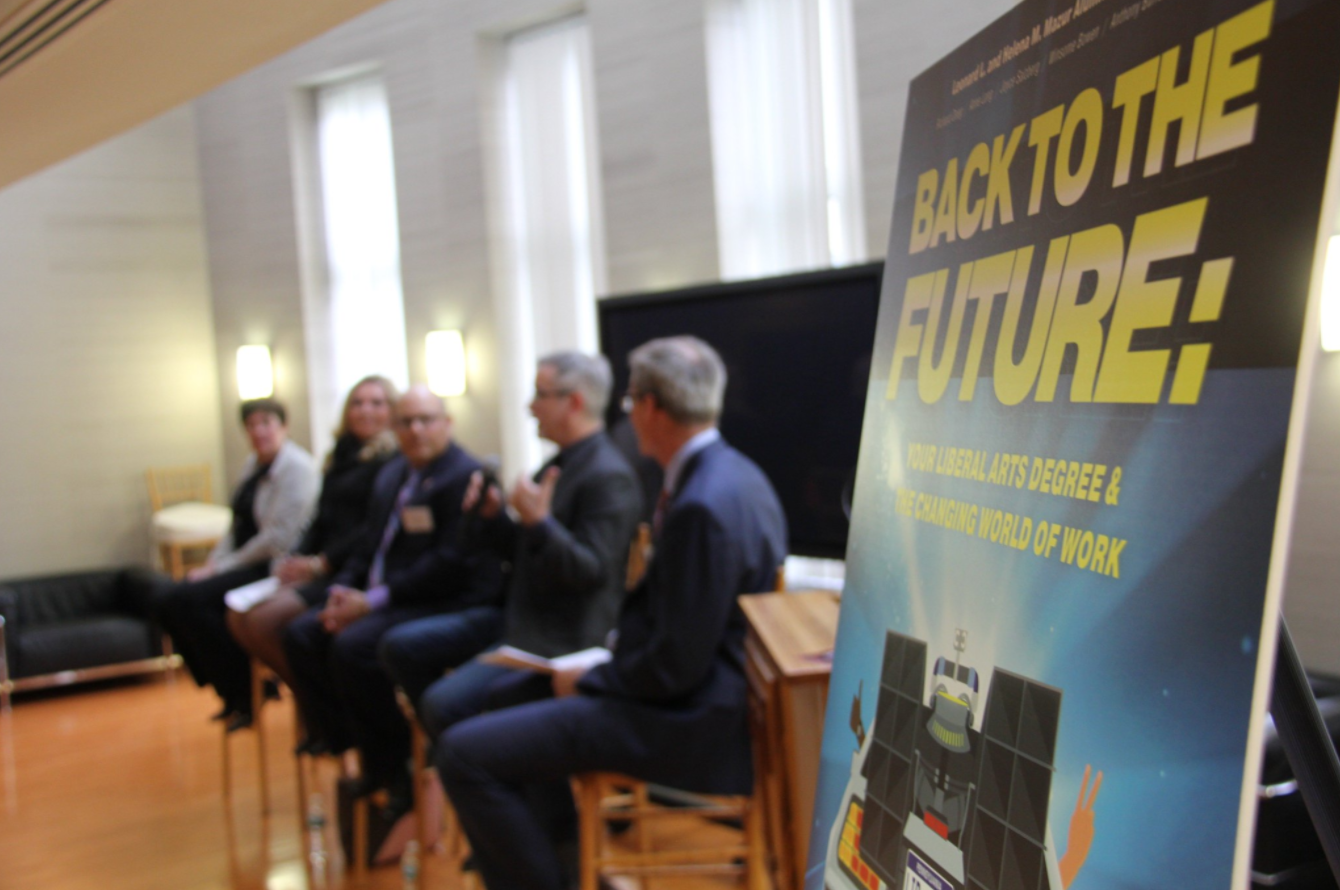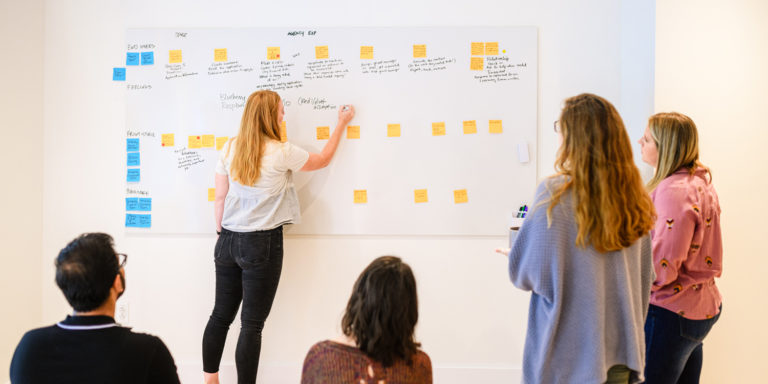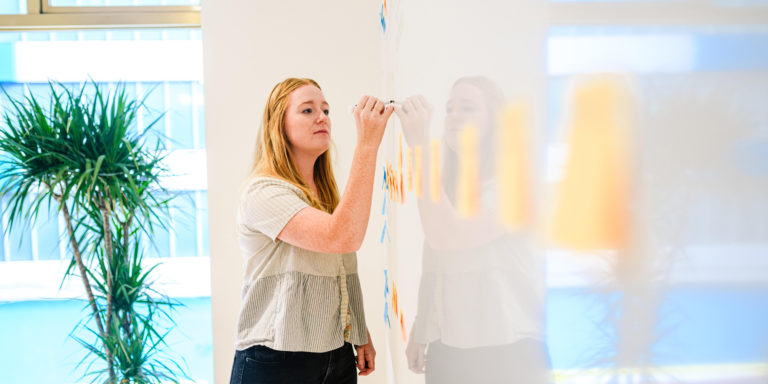Advice for Liberal Arts Majors: Consider a Career in UX

A few weeks ago, I had the honor of speaking to the College of Liberal Arts at Temple University. The fine folks at Temple, along with support from Leonard and Melinda Mazur, have started a program to help Liberal Arts students explore opportunities where their skills apply that may not be obvious.

I was really excited for this talk—one of my passions is helping young professionals get seated in their career. Years ago, I wrote a blog post offering advice to those seeking a career in UX. It’s one of my favorite pieces, so every once-in-a-while I go back and re-read it to make sure it’s still relevant.
Graduating with a degree that isn’t included in a job title can be daunting. I understand this conundrum, as my own path to UX was indirect, starting way back in my undergraduate days as an English major at Temple.
The liberal arts can include English, History, African American Studies, Anthropology, Sociology, Political Science, Religion, languages, and Gender Studies, among others. Outsiders sometimes regard a liberal arts degree as a stepping stone in a career that requires more school: Law School, Secondary Education, or Higher Education. If you haven’t chosen one of them, you become a victim of the never-ending stream of (hilarious) jokes laid out by the likes of Garrison Keillor*.
You can imagine the anxiety a Junior Political Science major experiences as she stares down the barrel of crushing student loans. Picture yourself as a Senior English major as he scans a stagnant job market for entry-level positions. It’s not fun.
I am living proof that not only is there hope, but there is a serious need for your skills—and one of the places you should be looking is in Experience Design.
Earlier this year, Billionaire Mark Cuban projected that there will be more of a need for Liberal Arts majors in the future. His point: technical, trainable skills like finance or a programming language only get you so far. Analysis and critical thinking are the key to advancement. They’re harder to teach, and they’re even harder to master.
Enter the practice of design—the merger of one or more technical skills with analysis and problem-solving. Here is a list of what liberal arts majors learn throughout their education that is similar to what experience designers do every day:
- Demonstrate a deep, unrelenting, genuine curiosity for humans interacting with the world
- Analyze how humans interact with the world
- Form hypotheses about why something happens in the world of human interaction
- Test a hypothesis against historical data
- Devise and conduct quantitative and qualitative research to test a hypothesis
- Describe and present what you’ve discovered in a clear, concise, and compelling manner
These are the analytical practices shared by the strongest designers and developers I have worked with.
The field of UX rarely lets our education define our career path. I stopped being surprised a long time ago by the educational and professional paths of my coworkers. As often as it is a direct match for what they do, I discover folks who studied something completely different—or who didn’t graduate from college at all.
But don’t take my word for it. I surveyed one of the smartest collections of people I know—Think Company’s staff—to get their perspective on the value of a liberal arts education:
Kimberly, Computer Science, Bryn Mawr College
Mary Patterson McPherson, President Emeritus of Bryn Mawr College, said that “[t]he purpose of a liberal arts education is to make your head a more interesting place to live for the rest of your life.” That’s because a liberal arts education conditions you to seek out the causes, connections, and drivers associated with practically anything you encounter. It teaches you to question everything, which forces you to keep learning and it reveals a larger, more interconnected world to you.
All organizations need systems-level thinkers—people who can connect the dots, who see those patterns and connections in all things. With a liberal arts degree you don’t get good at everything, but you have exposure to a wider breadth of fields, so you see myriad ways in which people and systems connect and influence one another.
Being a lifelong learner—an eternal student—is pretty much how I’ve always seen myself. That’s what companies need these days—people who will learn and grow, not be afraid to try new things, and to fail and try again. That’s the real market advantage in a liberal arts education.
Abby, Criminal Law, Penn State University
I think one of the most important things you learn as Liberal Arts students (versus going straight into design or dev), is how to process the problem versus learning how to produce the solution. One of the biggest challenges in most of our projects is fully understanding the “thing” that the client is solving. They come to us with an idea based on the pain points that they or their own clients are feeling, but often that’s just surface level. When you have a lot of experience with broader topics, you have a different perspective—and potentially greater insights—to dig deeper.
Ryan, Communications & Visual/Performing Arts, Muhlenberg College
Visual and Performing Liberal Arts encouraged empathy and teamwork. Every project was completed by individuals with different skill-sets and backgrounds, different world views and personal challenges. We were exposed to challenges that were not our own, so knowledge sharing and listening were key.
We weren’t taught what the problems were, but how to critically think through the challenge in front of us. We learned that a unique perspective from any number of teammates could bring a project into a whole new light; collaboration was crucial to creation, and variety in educational and cultural background brought the true magic to the process. More often than not, approaching a client’s problem from a different angle is the right direction.
Most importantly, in Liberal Arts, you learn to learn. Learning is a lifelong process, and that’s important to remember in an industry that is always changing.
Brittany, Industrial Engineering, Penn State University; Engineering Design & Innovation, Northwestern University
I do not have a liberal arts degree, but I do have advice: take classes outside of your major.
Find project-focused classes that will allow you to team up with individuals from different majors. My favorite classes in both undergrad and grad school were the classes in which I got to work with non-engineers. My biggest take-away from classes like that was learning how to work with people who had different working styles and different ways of problem solving than me. Not only will you learn how to work with them, but you will learn from them. You’ll pick up skills from them that you would probably never learn in classes that are core to your area of study.
Helene, Economics, Bryn Mawr College
I have mixed feelings about my own liberal arts education. Looking back, I see patterns of indecision that resulted in a labyrinth of intro classes and missed opportunities. On the other hand, my nieces and nephews had intensive education in the things they were passionate about: industrial design, music performance, film, biology, physics, theater, transportation. Most of them are pursuing graduate study and careers in their fields.
I feel that a liberal arts education, with its emphasis on critical thinking, broad understanding and writing, offers a solid foundation of skills that are crucial to any job. At the same time, I am not convinced that it uniquely prepares us for a changing and unpredictable career path. I can’t imagine that the experience of going deep—working very hard toward excellence in a single field—would make a person less fit to pursue even an unrelated career than a shallower, wider one. I feel confident that my nieces and nephews will do well, regardless of whether they stick with their chosen field, because they know how to strive for and attain true excellence.
At the same time, I surely benefited from my wide range of experiences. I can’t imagine what life would be like now without my year of History of Art, the class in Comedy (mind-blowing), my one semester of Poly Sci, my year of Geology, or all that French. I’m not expert in any of these subjects, or even in the subject of my major, but I’m a really good dabbler and I know a little about a lot of things. It’s possible that knowing a little about a lot helps me make mental connections that I wouldn’t otherwise make.
In the 1990s, being a dabbler probably allowed me to become a developer in a design studio, which was fun and interesting—and still is.
Back to Phil
Maybe you got this far and you’re curious about how to get into UX even though you don’t have what you think is a traditional design background. What’s next? Well, here are a few things you can do to break into this field:
- Read my blog post advice to those seeking a career in UX
- Read The Design of Everyday Things by Don Norman
- Practice the learnable skills UX Designers need to master (research, wireframing, workflows, etc.)
- Build a portfolio of those things
- Come Think With Us
Further reading to consider:
- Silicon Valley Needs to Get Schooled
- Why I Decided to Major in Computer Science at a Liberal Arts College
*Editor’s Note: This article was originally published in November, 2017, prior to the allegations that arose about Mr. Keillor in the workplace. Think Company has always been committed to maintaining a safe and respectful workplace. This article is not intended to condone any of the behaviors Mr. Keillor has been accused of conducting.



